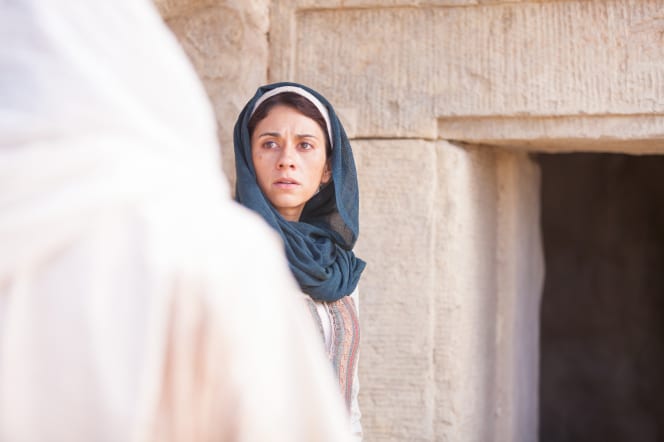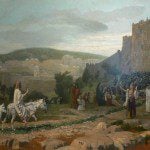
I offer here some thoughts that occurred to me as I read Acts 1 this morning. They regard the literality of the early Christian claim of Christ’s resurrection. For this blog entry (and for the sake of clarity and freshness), I’ll be using the English Standard Version (ESV) for the English text, unless I expressly indicate otherwise:
Acts 1:1-2:
In the first book, O Theophilus, I have dealt with all that Jesus began to do and teach,2 until the day when he was taken up, after he had given commands through the Holy Spirit to the apostles whom he had chosen.
The first book [πρῶτον λόγον; King James: former treatise; New American Standard: first account] to which Luke, the author of Acts, refers is plainly his own gospel. Scholars often speak of a coordinated two-part work that they call Luke-Acts. According to fairly strong tradition, Luke was a physician and, thus, among the best educated of the first generation of Christians. (He may have been a Gentile convert, or perhaps a Hellenized Jew.) The gospel of Luke begins with this explanation:
Inasmuch as many have undertaken to compile a narrative of the things that have been accomplished among us, 2 just as those who from the beginning were eyewitnesses [αὐτόπται (autoptai; literally “own eyes”)] and ministers of the word have delivered them to us, 3 it seemed good to me also, having followed all things closely for some time past, to write an orderly account for you, most excellent Theophilus, 4 that you may have certainty concerning the things you have been taught. (Luke 1:1-4).
This passage appears to suggest that Luke was relying for the writing of his gospel upon eyewitness testimony, perhaps even interviews, and there seems no reason to assume that he had abandoned that approach when he wrote the gospel’s sequel, the book of Acts. (For part of Acts, in fact, he may well have been Paul’s traveling companion and associate. [See the well-known “we” passages of Acts 16:10–17; 20:5–15; 21:1–18; 27:1–37; and 28:1-16.] If this is true, it would have afforded Luke plenty of time for talking, not only with Paul but with other early Christians. And, for many events, he would himself have been an eyewitness.)
Acts 1:3-4:
3 He presented himself alive [παρέστησεν ἑαυτὸν ζῶντα] to them after his suffering by many proofs [ἐν πολλοῖς τεκμηρίοις], appearing to them [ὀπτανόμενος αὐτοῖς] during forty days and speaking about the kingdom of God. 4 And while staying [συναλιζόμενος] with them he ordered them not to depart from Jerusalem.
Regarding 1:3’s “presented himself alive,” the relevant footnote in The UBS Greek New Testament: A Reader’s Edition (hereafter, UBS) gives the meaning of παρίστημι (from which παρέστησεν derives) as “to show,” “to present.” There is nothing in the verb to suggest metaphor.
Also in 1:3: ζῶντα (roughly zonta) is from the same Greek term that gives us words like zoo and zoology. It’s about animate — even animal — life. Literal. Not symbolic.
For the τεκμηρίοις of 1:3, the UBS gives “(decisive) proofs.”
The ESV footnote to 1:4’s staying offers the very down to earth eating as an alternative translation of συναλιζόμενος. It is a middle participle derived from the verb συναλίζω/συναλίζομαι. The Greek preposition σύν means “with,” “along with,” and shows up in such English words as symphony, sympathy, and synthesis. The UBS offers the relevant definition at 1:4 of “eat with (someone).” It could scarcely be more literal, even mundane. J. B. Phillips translates 1:4 as, simply, “On one occasion, while he was eating a meal with them, he emphasised that they were not to leave Jerusalem.”
Acts 1:9-10
9 And when he had said these things, as they were looking on [βλεπόντων αὐτῶν], he was lifted up, and a cloud took him out of their sight [ἀπὸ τῶν ὀφθαλμῶν αὐτῶν]. 10 And while they were gazing [ἀτενίζοντες] into heaven as he went, behold, two men stood by them in white robes, 11 and said, “Men of Galilee, why do you stand looking [βλέποντες] into heaven? This Jesus, who was taken up from you into heaven, will come in the same way as you saw [ἐθεάσασθε; etheasasthe] him go into heaven.”
The common Greek verb βλέπω (blepo), from which 1:9’s βλεπόντων and 1:11’s βλέποντες comes, simply means “to look.” It’s a usual verb for ordinary “looking.”
In 1:9, the “out of their sight” [ἀπὸ τῶν ὀφθαλμῶν αὐτῶν] is, literally, “from their eyes [ophthalmon].” (Think of ophthalmology and optics.) Martin Luther’s 1545 translation has “vor ihren Augen weg.” The 1995 Reina-Valera translation has “ocultó de sus ojos.” St. Jerome’s ancient Latin Vulgate has ab oculis eorum.
In 1:10, the participle ἀτενίζοντες comes from the verb ἀτενίζω, which means “to gaze at,” “to look intently at,” even “to stare.”
The ἐθεάσασθε of 1:11 is downright theatrical. The verb θεάομαι, from which it derives, means “to view” or “to gaze at.” It’s the word that gives us our noun theater.
These are words about literal seeing, not merely seeing “with the mind” or “in the mind’s eye.”
Finally, when Acts 1:15 says that “in those days Peter stood up [ἀναστὰς; anastas] among the brothers,” it uses a very ordinary verb that is directly related to the ἀναστάσεως (anastaseos) of Acts 1:21-23:
21 So one of the men who have accompanied us during all the time that the Lord Jesus went in and out among us, 22 beginning from the baptism of John until the day when he was taken up from us—one of these men must become with us a witness to his resurrection [ἀναστάσεως; anastaseos].” 23 And they put forward two, Joseph called Barsabbas, who was also called Justus, and Matthias.
The Greek ἀνάστασις (anastasis) , which we typically render as “resurrection,” simply means “standing up,” or “getting up.” There is nothing intrinsically mystical or spiritual or religious about it. Unless there’s reason to view it otherwise, it’s a very literal thing.
Small matters, in themselves. Certainly. But part of a much larger cumulative case through which I’m slowly thinking my way. This was physical. Real, not imaginary. To be understood literally. The witnesses, ordinary people, used ordinary language to describe what they really saw. That, certainly, is what Luke is saying.












